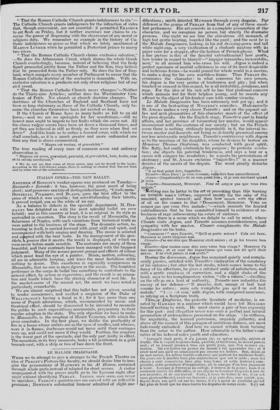ITALIAN OPERA—THE NEW BALLET.
ANOTHER of ROSSINI'S weaker operas was produced on Tuesday- . Ricciardo e .goraide: it has, hoWever, the great merit of being short; and possesses one trio of distinguished beauty, "Cruda • DONZELLI, Pis4aom, and BLASTS,- gave the best effect io the piece of which it • was capable ; but notwithstanding their talents, . it proved insipid,'yea as the white of an egg. As a balance to defects in the operatic department, M. DES- HAYES has delighted us with the most splendid ballet we ever • beheld ; and in this country at least, it is as original in its style as ' unrivalled in execution. The story is the revolt of Masaniello, the fisherman of Naples, with such variations from historical truth as were suited to the business of the stage. The dramatic action, in- teresting in itself, is carried forward with great skill and spirit, and accompanied with both singing and dancing. The music is selected and aciapted with the best taste. In the management of the spec- ta'cle, b. genius (for it merits the word) is displayed, of which we were never before made sensible. The costumes are many of them beautiful, and their contrasts have been managed with the happiest . judgment. Many of the scenes present groups and effects of colour which must feast the eye of a painter. Music, motion, colouring, all are in admirable keeping, and leave the most fastidious critic nothing to desire. This excellence is especially conspicuous in Masamello, that no one is mere figure in the scene. The humblest performer in the corps de ballet has something to contribute to the general effect, by action or expression ; and the result is an anima- tion and bustle which have the stirring character of real life. In the market-scene of the second act, the merit we have noted is v remarkable.
We are almost surprised that this ballet has not given scandal to tender consciences, and excited a suspicion of the Duke of WELLINGTON'S having a hand in it ; for it has more than one scene of Popish adorations, which, recommended by music and theatrical effect, should be discovered to be intended to reconcile the public to such superstitious ceremonials, preparatory to their regular adoption in the state. The only objection we have to make to Masuniello, is the eruption of Mount Vesuvius, with which the piece concludes. In the first place, we dislike the prodigality of . fire in a house whose outlets are as the eyes of needles, and whence, were it in flames,' duchesses would not move until their carriages were up, and could not move if they would. Further, the eruption is the worst part of the spectacle, and the only part faulty in effect. The mountain, in its fiery moments, looks a fat gentleman in a gold brocade vest, with a strip or two of lace down the front.


















 Previous page
Previous page